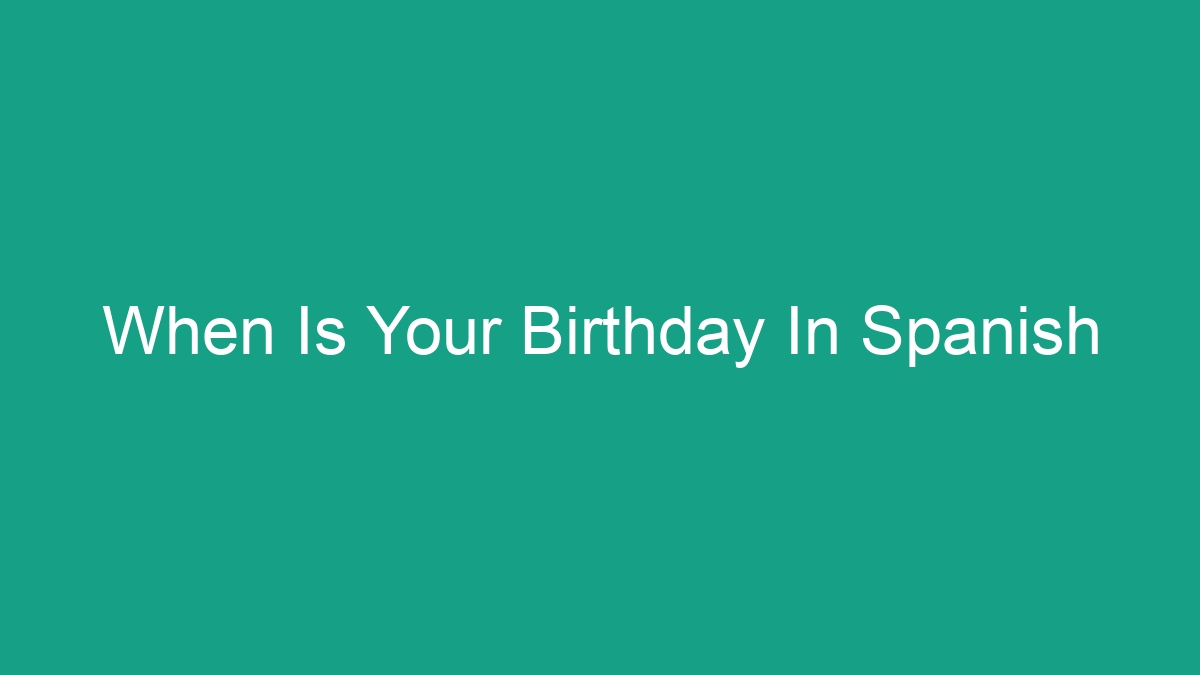
Learning how to ask and tell someone the date of their birthday in Spanish is a fundamental skill for anyone learning the language. Whether you are planning a birthday party for a Spanish-speaking friend or simply trying to improve your language skills, being able to talk about birthdays is essential. In this article, we will explore the different ways to ask and answer the question “When is your birthday” in Spanish, as well as some cultural insights related to birthdays in Spanish-speaking countries.
How to Ask “When Is Your Birthday” in Spanish
There are several ways to ask someone about their birthday in Spanish. Here are a few common variations:
- ¿Cuándo es su cumpleaños? – This is a formal way to ask “When is your birthday?” in Spanish. Use this when speaking to someone you don’t know very well or someone older than you.
- ¿Cuándo es tu cumpleaños? – This is the informal version of the previous question. Use this when speaking to friends, family, or people your age or younger.
- ¿Cuál es tu fecha de nacimiento? – This literally translates to “What is your date of birth?” and is another way to ask someone about their birthday in Spanish.
- ¿En qué fecha cumples años? – This question is more specific, asking for the exact date when the person has their birthday.
How to Answer “When Is Your Birthday” in Spanish
When someone asks you about your birthday in Spanish, you can respond with the following variations:
- Mi cumpleaños es el (X) de (month). – For example, “Mi cumpleaños es el 15 de abril” translates to “My birthday is on the 15th of April.”
- Nací el (X) de (month). – This means “I was born on (date) of (month).” For instance, “Nací el 3 de julio” means “I was born on the 3rd of July.”
- Mi fecha de nacimiento es el (X) de (month). – This is a more formal way to communicate your birthday in Spanish, translating to “My date of birth is the (X) of (month).”
Cultural Insights
In Spanish-speaking countries, birthdays are celebrated with various traditions and customs. Here are some interesting cultural insights related to birthdays:
- Quinceañera – In many Latin American countries, a girl’s 15th birthday, known as the quinceañera, is a significant milestone celebrated with a grand party. It symbolizes the transition from childhood to womanhood.
- Las Mañanitas – This is a traditional birthday song in Mexico and other Spanish-speaking countries. It is often sung early in the morning to wake the person up on their birthday.
- Piñata – A popular tradition during birthday parties in Mexico and some other Spanish-speaking countries involves breaking a brightly decorated paper mache container filled with candies and toys. It is usually hung from a tree or ceiling and children take turns hitting it with a stick while blindfolded until it breaks open.
- Tres Leches Cake – In many Spanish-speaking countries, including Mexico and Central America, a common birthday dessert is the Tres Leches cake, a sponge cake soaked in three different types of milk and topped with whipped cream and fruit.
Conclusion
Asking and telling someone about their birthday is an essential part of communication in any language, and Spanish is no exception. By familiarizing yourself with the different ways to ask and answer the question “When is your birthday?” in Spanish, you can better connect with Spanish speakers and participate in their birthday celebrations. Additionally, understanding the cultural insights related to birthdays in Spanish-speaking countries can provide a deeper appreciation for their traditions and customs. So, the next time you engage with a Spanish speaker, don’t hesitate to ask them “¿Cuándo es tu cumpleaños?” and share in the joy of celebrating their special day.




